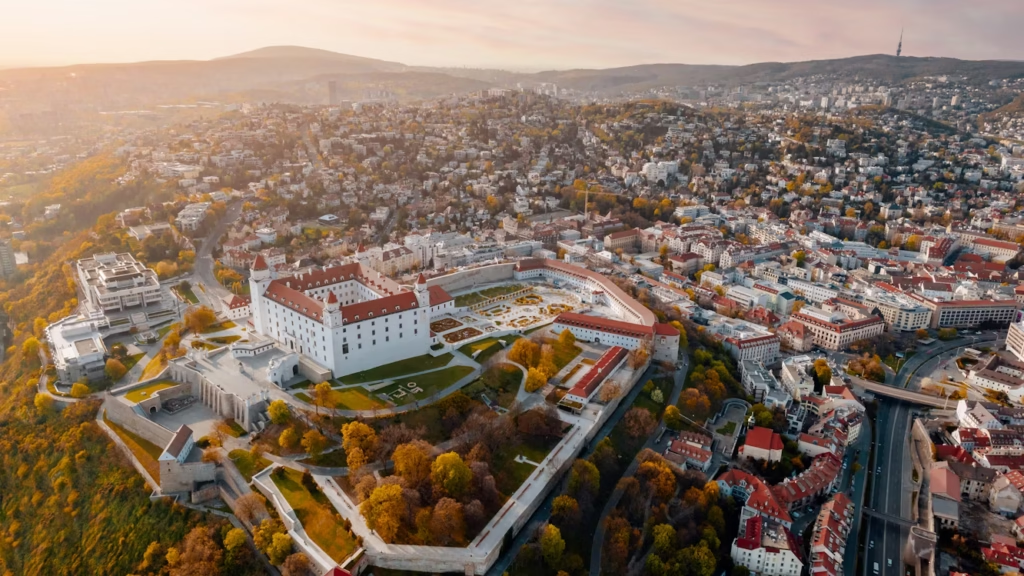🇸🇰 Ready to start a new adventure in Slovakia? If you’re planning a move to Slovakia, this comprehensive guide covers everything you need for a smooth transition.
What should I know about living in Slovakia at a glance?
- Flag: 🇸🇰
- Population: Around 5.5 million
- Currency: Euro (EUR)
- Average salary: Around 1,500 EUR/month
- Live ARS ←→ Dollar: Use dynamic currency converters for the latest exchange rates
- Slovak Statistical Office (ŠÚSR), 2024
- European Central Bank (ECB), 2024
- XE, 2024
Reviewed by World Population Review, last updated in July 2025; European Central Bank, last updated in July 2025; Trading Economics, last updated in April 2025.
How Much Does It Cost to Move Your Belongings to Slovakia?
The cost of relocating to Slovakia depends on factors such as shipment size, transport method, point of origin, and any additional charges. Below are typical market rates as of mid‑2025:
| Shipment Method | Transit Time | Estimated Cost (USD) |
| 20‑ft container | ~1–2 weeks | $1,200–$2,500 |
| 40‑ft container | ~1–2 weeks | $2,200–$4,500 |
| Air freight (per kg) | Few days | $3.50–$8+ |
| Customs / Fees | — | $100–$400+ |
Reviewed by Freightos Market Analytics Team and Maersk Logistics Research Team, last updated in July 2025
Use a real-time moving calculator for a tailored quote with ReloAdvisor.
Real-life case:
“I relocated to Bratislava in April 2025 with about 12 cubic meters of belongings using a shared 20‑ft container. The total cost, including customs clearance and delivery to my new home in Bratislava, was around $2,000. The shipment arrived in about two weeks, and the moving company handled everything professionally, making the relocation experience stress-free.” — Sarah T., moved in April 2025
Many people relocating to Slovakia choose to settle in one of the five most popular cities for newcomers, including Bratislava, Košice, Prešov, Žilina, and Nitra. These cities offer diverse career opportunities, rich cultural experiences, efficient public transportation, and vibrant international communities.
How to understand the cost of living in Slovakia?
As of mid‑2025, Slovakia offers a moderate cost of living compared with many Western European countries. According to Numbeo, a single person in Bratislava can expect monthly expenses excluding rent of roughly €805 (≈ US $950). Housing is one of the largest costs, with a one‑bedroom apartment in the city centre averaging around €600–€700 per month, while outside the centre it drops to about €450–€550. Utilities for a moderately sized apartment typically cost €150–€200 monthly, and a monthly public transportation pass averages €25–€35. The average net monthly salary in Slovakia is approximately €1,160, allowing many residents to maintain a comfortable lifestyle. However, living in larger cities like Bratislava may require careful budgeting to balance rent and other living expenses.
| Expense Category | Estimated Cost (Bratislava, €) |
| Monthly expenses (excluding rent) | 805 |
| One-bedroom apartment (city centre) | 600–700 |
| Utilities (electricity, heating, water, etc.) | 150–200 |
| Public transportation (monthly pass) | 25–35 |
Reviewed by Numbeo Data Quality Team, last updated in June 2025

How to Apply for a Visa and Meet Residency Requirements for Slovakia?
Foreign nationals wishing to live, work, or study in Slovakia need a visa or residence permit. Common options include work permits, student visas, and temporary or permanent residence permits.
To stay long-term, you must comply with Slovak residency rules, including maintaining valid permits, registering your address, and reporting changes. Permanent residency may be available after meeting criteria such as holding a temporary permit for the required period and passing health and character checks.
- Visa info: Slovak Ministry of Foreign Affairs
- Application & appointments: Slovak Consular Services
Reviewed by the Ministry of Foreign and European Affairs, last updated in July 2025
How to Access Healthcare and Insurance Options in Slovakia?
Slovakia offers a universal public healthcare system funded primarily through mandatory health insurance contributions. All residents, including foreign nationals with a long-term residence permit, are required to have health insurance through a public health insurer. The system covers general practitioner (GP) visits, specialist care, hospital treatments, and certain medications.
Foreign residents must register with a Slovak health insurance provider to access public healthcare. Those not covered by public insurance, such as short-term visitors, should obtain private health insurance to ensure adequate medical coverage.
Reviewed by the Ministry of Health of the Slovak Republic, last updated in July 2025
How to Navigate the Housing Market as a Newcomer to Slovakia?
Renting a home in Slovakia usually requires a security deposit of 1–3 months’ rent plus the first month’s payment. Tenants need ID, proof of income, and sometimes references. Leases are typically 12 months, with utilities like electricity, water, gas, and internet usually paid separately.
Popular residential areas for newcomers include:
- Bratislava – Staré Mesto: Historic city centre with cultural landmarks, restaurants, and easy access to public transport.
- Bratislava – Petržalka: Modern apartment complexes, parks, and good transport links.
- Košice – Staré Mesto: Vibrant cultural hub with shops, cafes, and historic architecture.
- Žilina – Centrum: Central location with access to services, schools, and transport.
- Nitra – Centrum: Mix of urban and residential living, suitable for families and professionals.
Reviewed by the Slovak Real Estate Association and Numbeo Property Data, last updated in July 2025
How to Understand Your Tax and Pension Obligations in Slovakia?
If you are considered a tax resident in Slovakia—generally determined by having your permanent residence or staying in the country for more than 183 days in a calendar year—you are taxed on your worldwide income. Non-residents are taxed only on income earned in Slovakia. Employees and self-employed individuals must also contribute to the mandatory pension system, which serves as compulsory retirement savings.
Slovakia has double taxation treaties (DTTs) with many countries to prevent individuals from being taxed twice on the same income. The Slovak Tax Authority (Finančná správa) administers all tax obligations, including income tax, social security, health insurance contributions, and pension regulations.
| Tax Component | Description | Tax Component |
| Income Tax | Tax on income earned in Slovakia (residents taxed on worldwide income) | Income Tax |
| Pension Contributions | Mandatory retirement savings | Pension Contributions |
| Double Tax Treaties | Prevent double taxation of international income | Double Tax Treaties |
Reviewed by Finančná správa (Slovak Tax Authority), last updated in April 2025
How to Comply with Customs and Duty Rules When Moving to Slovakia?
When relocating to Slovakia, used household goods and personal effects can generally be imported duty- and tax-free if they have been owned and used for at least 6 months and are intended solely for personal use. To qualify, you must submit a customs declaration along with a detailed inventory, passport, and proof of residence. Items should arrive around the time of your relocation.
New or commercial goods, high-value electronics, and certain restricted items—such as firearms, specific medications, or animal products—may be subject to customs duties or require import permits. Accurate and complete declarations are essential to avoid inspection delays, fines, or confiscation.
Reviewed by the Slovak Customs Administration, last updated in February 2025

Real-life case:
“When I relocated from Prague to Bratislava, I prepared a detailed inventory of all my personal belongings and submitted it along with the required customs declaration to the Slovak Customs Administration. Since my items had been owned and used for over six months, they qualified for duty- and tax-free import. My shipment by road arrived in about two weeks, and the movers handled all customs procedures efficiently. Everything was delivered to my new home in excellent condition.” — Martin K., moved in May 2025
How to Manage Pet Relocation When Moving to Slovakia?
Bringing pets into Slovakia requires compliance with EU and Slovak animal health regulations to protect public and animal health. Dogs, cats, and ferrets must be microchipped, vaccinated against rabies, and accompanied by a valid veterinary health certificate issued by an authorized veterinarian. Additionally, pets entering from outside the EU require an EU pet passport or import permit.
Slovakia follows the EU classification of countries for rabies, and pets from non-EU countries may need rabies antibody testing and a quarantine period depending on the origin. It is recommended to plan well in advance, as documentation and permit approvals can take several weeks. Many pet owners use licensed pet relocation services to ensure vaccinations, permits, and travel logistics are correctly handled.
Reviewed by the Slovak Ministry of Agriculture and Rural Development and State Veterinary and Food Administration (SVFA), last updated in March 2025
How to Import a Car and Swap Your Driver’s License in Slovakia?
Imported vehicles in Slovakia must comply with EU and Slovak safety, environmental, and registration standards. Cars from outside the EU may be subject to customs duties and VAT (20%). To register a vehicle, you must submit the vehicle title, proof of ownership, and technical compliance certificates to the Slovak Transport Authority (MDV SR). Vehicles undergo a technical inspection to confirm roadworthiness and emissions before registration.
Foreign driver’s licenses are valid for up to 6 months. Long-term residents must exchange their license for a Slovak driver’s license, which may require a written and practical test depending on the country of origin.
Reviewed by the Slovak Transport Authority and Customs Administration, July 2025
How to Open a Bank Account and Obtain a Tax ID in Slovakia?
Opening a bank account in Slovakia is straightforward for residents and newcomers. You generally need a valid passport, proof of residence, and, if applicable, a residence permit. Major banks—Slovenská sporiteľňa, VÚB, Tatra Banka, and ČSOB—offer services including current and savings accounts, international transfers, online and mobile banking, and support in English.
For tax purposes, anyone working or earning income in Slovakia must obtain a tax identification number (DIČ) from the Slovak Tax Authority (Finančná správa). This number is required for employment, banking, and tax filing. Applications can typically be submitted in person or online with passport and residency documentation.
Reviewed by the Slovak National Bank and Slovak Tax Authority, July 2025
Where can I find tools and more resources before moving?
For further guidance, make use of the volume calculator, book a video survey, or explore comprehensive guides for Finland and Belgium with ReloAdvisor.



